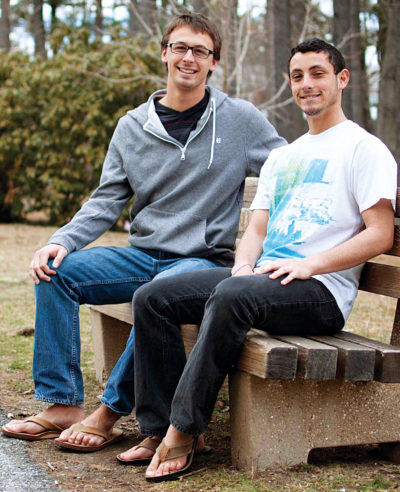
Photo: Ben Staples
Cole Bettles ‘13 (left) and Joey Roth ‘14
If you grow up in California, leaving all that sun and warmth isn’t easy. “I do miss California,” says Cole Bettles ’13. “I miss the ocean, and I miss surfing and my sandals.”
Bettles and his friend, Joey Roth ’14, call Southern California home. Bettles hails from Ojai; Roth from Laguna Beach. Sitting in Trim Dining Hall during finals week in December, just as the chilly reality of winter was hitting campus, Bettles and Roth came up with a plan for a California adventure, a long bike trip down the coast starting north of Los Angeles in the small town of Ojai and ending in the upscale San Diego neighborhood of La Jolla. Along the way, the pair would hold beach cleanups, film their travels for a future video, and surf. Throughout the trip, they hoped to raise awareness about the coastline’s fragility. The beaches and ocean may be beautiful, Bettles says, but they need to be protected.
After lining up sponsors to provide a camera, clothes, and help in marketing one of the cleanups, the pair kicked off their eight-day trip in January. The trek was supposed to cover about 240 miles, though wrong turns and mishaps added another 40 miles or so. That’s a lot of pedaling for two guys who didn’t do any training. “The first five miles every day were miserable,” Roth says. “Luckily, we headed downhill most of the time.”
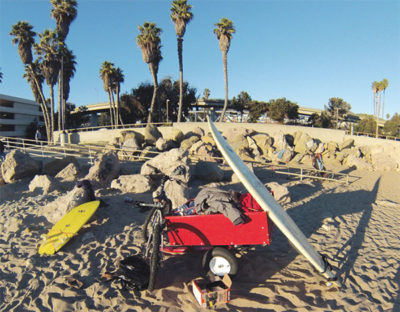
Photo courtesy of Cole Bettles
Almost from the start they faced a setback when the cart they were pulling broke. The cart had carried their surfboards and gear, but with help from Bettles’ father, they used pipes, connectors, and glue to build jury-rigged racks that attached to the side of their bikes. These makeshift racks couldn’t hold all of their gear, so Roth and Bettles had to leave some behind. Extra changes of clothes, for instance, were a luxury they no longer had. The two bikes and their loaded-up racks made for a strange sight rolling down the road. People constantly approached Roth and Bettles and asked questions. “Even in Venice Beach, we were turning heads,” Roth says. “People would just look at us and say, ‘Explain.’”
At night, the pair either crashed on friends’ couches or camped, which could be tricky. Nights outside were chilly, given that their tent was another item left behind.
Sunset also brought a sense of urgency. Once the sun started going down, they needed to find a place to settle for the night or be left riding in the dark. As the sun set one evening on the Pacific Coast Highway in Malibu, they realized they couldn’t make it to the nearest campsite, so they pulled off the road onto a beach and fell asleep by the water. In the night, Bettles says, “I heard the waves crashing, then getting louder and louder.” Finally, in the wee hours, the tide came in. It was nearly lapping onto their sleeping bags. Roth nudged Bettles awake. “Dude, we should move,” he said.
With the footage they shot, the pair are putting together a short film and working with their sponsors to figure out how to distribute it. Looking back on the trip, Bettles and Roth realize it all didn’t go smoothly, but that doesn’t matter. They organized three cleanups and talked with many people about the environment. And they surfed. “You should not be afraid of mishaps,” says Bettles. “They shouldn’t scare you away from doing a project worth good.”—John Crawford
]]>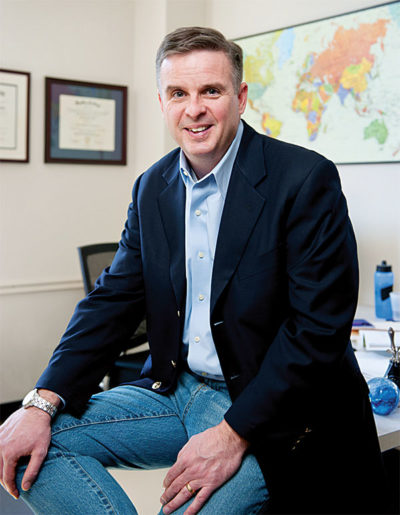
Photo: Webb Chappell
Babson Associate Professor Andrew Corbett
Have you taught online courses before?
Yes, in the past at other places, and I’ve used online as part of a course. But I think online education is evolving. What people thought of online courses maybe as little as two or three years ago, certainly 10 years ago, has changed.
How has online education changed?
Things have evolved dramatically. Back then an online course was a bunch of PDFs to read and some PowerPoints to watch. Now we’ll use various technologies. You can click and listen to a lecture. Click and read something. Click and find slides. CITG [Curriculum Innovation and Technology Group] built a beautiful interface that makes it easy to use. Students can do this on their own all week, and then we can come together once a week and discuss topics. They can interact, ask questions, virtually raise their hand.
Do you lose anything being online?
We get all the seeing, listening, and interacting with this technology. That’s the beauty of how this can work if it’s done well. The people in CITG and Exec Ed, they’re a great team. We’re way ahead of the curve than most places doing this. I don’t see online completely replacing an undergraduate education. There is so much more to education. But when it’s done well with the tools that we have, it’s very powerful.
What about human interactions?
Yeah, you might argue that there are certain advantages to face to face. You don’t get those spontaneous collisions. The pure networking isn’t there. Those things are great. But think of it this way. We already have people coming from Brazil, Nigeria, the U.K., California, Chicago. When we delivered this program last fall, three or four people flew in for this one-day session. One came from as far as India. This is a much better and more efficient way for them to learn this concept.—Donna Coco
]]>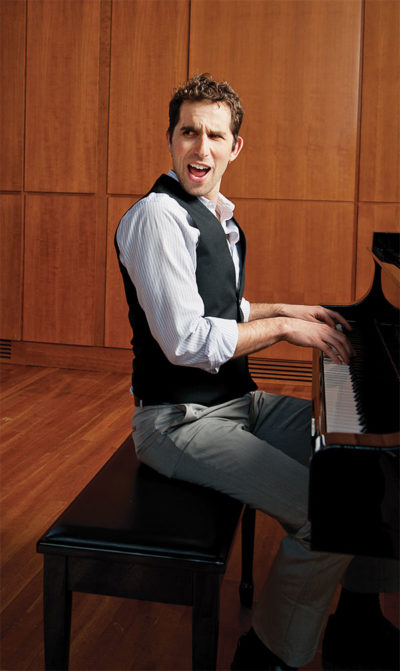
Photo: Webb Chappell
At 7 years old, with hands finally big enough to play the piano, Michael Scherr began lessons. Thus commenced his lifelong affair with music. In high school, he turned to jazz, forming a band and playing at local events. After college, he played gigs to make ends meet, toured with a rock band for four years, became a dueling pianist, and started a production studio. Now a first-year MBA, Scherr is exploring the next phase of his professional career.
What rock band were you in? Sons of the Addicted. It was heavy metal with a little bit of reggae and jam feel. We opened up for Def Leppard and Chicago, and all these bands that were huge. We got signed by a record producer who put $100,000 behind us and put us in a studio in L.A., but the album never took off. The band never took off.
What did you do next? Dueling pianos. It’s two piano players taking requests, bringing people up for their birthdays, and roasting people. So it’s a mix of stand-up comedy, improv, singing, and playing.
Why start a production studio? An opportunity kind of presented itself. I was working with a producer to co-write some electronic dance music. He was engineering in a studio that wanted to close and sell its gear. So basically for a quarter on the dollar, we got $40,000 worth of gear. At that point, we’re like, well, why not each put in a little money and have a full-size studio? We spent the summer of 2010 building the whole thing ourselves. My partner is running it, and I have a percentage of ownership. It’s making money, but it’s so competitive.
Why come to Babson? I needed a change. I was turning 30 and wasn’t where I wanted to be musically, which was touring the world or making six figures on licensing deals or recording. As a dueling piano player, you actually can make a good living, but you’re never home. Your nights and weekends are gone. To get anywhere, I needed something else, and a business degree made sense. I’m passionate about cooking and healthy food, so I’m exploring the idea of starting a healthy snack company. I’d also like to work for a socially conscious for-profit or in innovation and design. But I will gig until the day I can no longer play piano.
We have to ask, karaoke song? I love Dream On by Aerosmith. When I hit those high screams that almost no one can hit, I get a standing ovation.—Donna Coco
]]>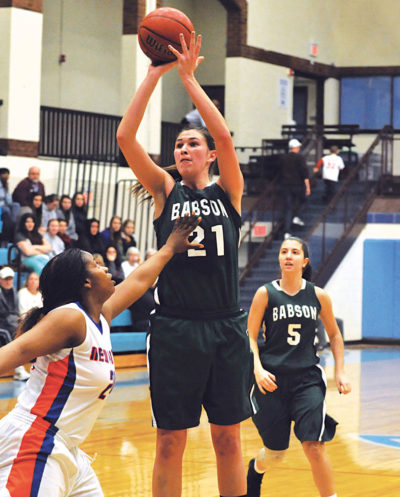
Photo: Mickey Goldin
Sarah Collins ’13
The women’s basketball team posted its second straight 26-3 record while going 18-0 in the NEWMAC for the fourth consecutive season. Babson qualified for its fifth straight NCAA Tournament, advancing to the round of 32 for the fourth successive season. The College won its fifth consecutive NEWMAC Tournament and fourth straight regular season conference championship while extending its league winning streak to 85 games. A WBCA and D3hoops.com All-American, Sarah Collins ’13 was voted ECAC New England and NEWMAC Player of the Year and was named to the first team for those conferences. Linnett Graber ’16 was selected NEWMAC Rookie of the Year.
Men’s Alpine Skiing
History was made during the men’s alpine skiing season. Babson secured the program’s best finish in its 10 appearances at the USCSA National Championships, placing third in the country. The Beavers’ lofty marks didn’t end there, as they also won their inaugural USCSA Eastern Regional title. Carter Dowd ’16 earned USCSA All-America honorable mention laurels in the giant slalom and ECSC Skier of the Year honors. Sam Barber ’16 and Graham Quisenberry ’16 were named USCSA All-America honorable mentions in the combined standings, and Dowd and Zach Breakstone ’13 were named to the All-MacConnell Division team.
Men’s Ice Hockey
The Beavers set two defensive records en route to winning their first ECAC East Tournament title since 2009. The team finished with a program best 2.20 goals against average, while goalie Zeke Testa ’13 broke his school record by producing a 1.85 GAA in 17 games. Going 18-7-5 overall and 10-5-3 in league play, the squad advanced to the NCAA Tournament quarterfinal round. Testa was named an AHCA All-American, ECAC East Goalie of the Year, and to the all-conference first team; Ryan Heavey ’14 earned second-team honors; and Jamie Murray ’16 picked up all-rookie team accolades as a goalie.—Scott Dietz, associate director of athletics
]]>One of a parent’s main responsibilities, Judy Achar believes, is to instill in her children a concern for their fellow man. “We live next to poverty,” says Judy, who’s from Mexico City. “We see it all the time.” Through the years, she taught her three kids not to ignore the poor. The family volunteered at a medical clinic and organized drives to collect food and blankets for those in need.
“My mom made sure to keep us involved in the community,” says her son, Victor Achar ’13. “This was always a part of our family.” Victor remembers how the family would hand out food to the homeless around Mexico City and head out of the city to the mountainous area of Toluca to deliver blankets. “For them, a blanket would really make a difference,” Victor says. “It gets cold there in winter.” Those experiences influenced Victor as he grew up, made him wonder about the ways he could make a difference. “You’re always thinking beyond yourself,” he says.
Today, he and his mom work together to help others through her nonprofit, Mitz, which Judy founded in 2003 as a way to support underprivileged children at a local Montessori school. She had worked at the school as a teacher, then as a fundraiser, but she realized that donors can be fickle. To provide a more reliable revenue source, she started Mitz, which sells hand-woven items such as bags, wallets, and cases. The weavers live in low-income areas where job opportunities are hard to find, and the items are made from leftover food packaging, so Mitz not only helps the school, but also gives poor people work and reduces waste.
Victor was a teenager when Mitz began, and he and his siblings helped their mom with the nonprofit any way they could. They sold items to friends, assisted her when she set up shop in a bazaar, and collected trash. Nowadays, Mitz receives waste packaging from companies such as Kellogg, Kraft, and Mars, but in Mitz’s early years, the nonprofit scrambled to find usable trash. Whenever a friend was eating a candy bar or bag of chips, Victor asked them for the empty wrapper. He also organized a regular trash collection at his school.
Armed with his Babson education, Victor now helps Mitz with branding and with locating stores that may want to sell its products. Judy doesn’t have a business background, so his help is appreciated. “My mom is extraordinary,” he says. “She is extremely hard working. She is a strong believer in what she does.”
Graduating in May, Victor is approaching decision time. Where will he go after Babson? Right now, he’s leaning toward working in the U.S. for a year or two. “My parents want me to move back to Mexico,” he says. “They miss me. But whatever I do, they’ll support me.” Wherever he goes, he plans to stay involved with Mitz in some way, and that pleases Judy. “I am very proud to know Victor is following in these footsteps,” she says. “It fills me with satisfaction. I feel proud to work with my son. Victor’s contribution has been a cornerstone.”
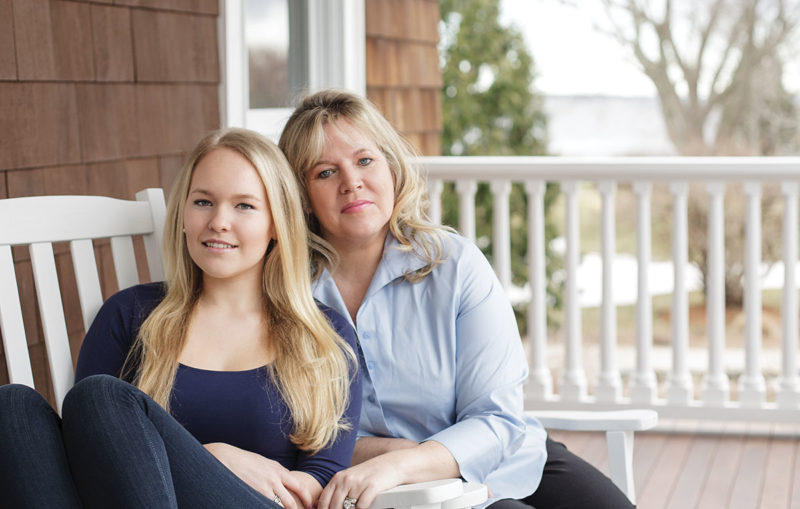
Photo: Michael Piazza
Ava ’16 and Kim Anderson
Ava ’16 and Kim Anderson — Ava Anderson Non-Toxic
The idea for their business came suddenly. Kim and Ava ’16 Anderson, mother and daughter, were watching the TV news when a report came on about teenagers affected by potentially harmful ingredients in personal care products. “I was shocked and wanted to make sure I wasn’t exposed,” says Ava, who was then a freshman in high school. “I ran right to my bedroom.” She didn’t like what she saw and began searching online for more information on ingredients. “Every piece of data spurred me to do more research,” she says.
Ever since she was little, Ava had a strong sense of right and wrong, her mom recalls, and that news report struck a nerve. “It changed her life,” Kim says. She watched Ava grow more and more concerned about the chemicals in products, watched as she started tossing things in the trash. Shampoo, mascara, deodorant, lipstick. Ava scrutinized not only the products she used, but also those of her mother and grandmothers. “She threw everything out in the house,” Kim says.
She may have been a teenager, but as her concerns about ingredient safety continued to linger, Ava eventually had a big idea, to start her own line of products. Doing so would require the help of her mom, a successful businesswoman who recently had owned a thriving home-goods store in their hometown of Barrington, R.I., but was now retired. To convince her mother, Ava took Kim to a cosmetics store to stroll the aisles and examine products and their ingredients. “She had had a year of retirement, and I said, ‘Back on your feet. It’s time to get back to work,’” Ava says. Starting a company would be hard work, but Kim was convinced. “I got it. I supported it,” she says. “I was blown away by her knowledge. We’ve been lucky as a family that we have everything we need. We decided to take this on.”
Chemists and a manufacturer were found, and in 2009, Ava Anderson Non-Toxic was launched with six products. Throughout high school, Ava didn’t pursue sports or extracurricular activities. Her company was her focus, and she and her mom became business associates. Ava was CEO, and Kim was president. During dinnertime, the pair talked shop, which annoyed Ava’s father. “He’s been totally supportive, but he wanted to keep that talk away from the dinner table,” Ava says. “It’s hard to separate business and personal life.”
The company has grown steadily. It now offers about 60 products and has a sales force of 2,000 consultants spread out over every state. Ava has received much media coverage, appearing in Glamour, Seventeen, and Teen Vogue, and she has lobbied Congress members on product safety. “I’ve watched her grow into a confident, strong woman in doing this business,” Kim says. “I’ve learned a lot from Ava, and she’s learned a lot from me.” Indeed, Ava closely watches her mom in action. “I get a ringside seat to how skillfully she handles all situations,” Ava says. “She is truly kind to everyone, all with as much grace as anyone can muster.”
Now that Ava is a college student, Kim takes the lead in running the business. But the two talk every day and exchange tons of emails. “When she finishes, she can come home and run the company,” Kim says. “I’ll always be involved, but it’s her baby.”
David, MBA’07, and Sandy Hu — Special Fork
When raising their two boys, Sandy Hu and her husband were dedicated to eating dinner together every night as a family. It wasn’t easy. She worked in public relations. He was a CFO in Silicon Valley. Both were busy, but they made it work. Whichever parent rushed home first would rustle up the meal, and then the four would sit, eat, and talk about their days. “We were committed to family dinner hour,” Sandy says. “I think it is so important.”
Her son, David Hu, MBA’07, remembers how those meals were a constant in their hectic lives, and he remembers the simple yet delicious food his parents would make, the pasta, fried chicken, and chicken teriyaki. “There were very few leftovers,” he says.
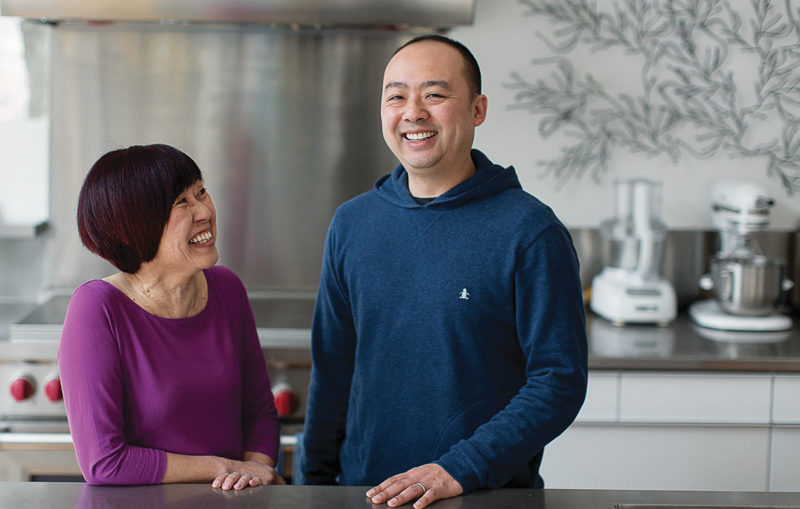
Photo: Annie Tritt
David, MBA’07, and Sandy Hu
Today, Sandy and David work together, and their venture has its roots in those long-ago meals. They are co-founders of San Francisco-based Special Fork, a mobile recipe website that focuses on everyday meals that can be prepped in 30 minutes. “You come home and have to put something on the table,” Sandy says. “We are trying to solve the dinnertime dilemma.”
Sandy’s PR work had centered on the food industry for years, and she long had the idea for a recipe website for easy-to-make meals. She simply didn’t have the needed technical and business know-how to make the venture a reality. A product manager at Virgin Mobile, David had just that. “This was only an idea in my head,” she says. “It takes someone to work that idea out. In comes David.” The site launched in 2009 and took its name from a long-time family ritual. During dinnertime, whenever he truly enjoyed a meal his parents prepared, David’s younger brother, Chris, would swap his dinner fork for a mismatched fork out of the utensil drawer. This quiet sign of approval began when Chris was 6 or 7 and continued until he went off to college. The mismatched utensil became known as the “special fork.”
Sandy may be David’s mom, but at the office, they keep their relationship formal. “The hardest thing is to refer to her by her first name,” he says. “It’s a little weird.” Otherwise, they work well together. They have the same interests, same temperament. “We don’t fight,” he says. “Even as a kid, we didn’t fight. We’ve always had an open line of communication.” Of course, they occasionally have differences of opinion, but they talk them out, like the time they disagreed about what kind of recipes to focus on. “I felt Special Fork should have recipes for everything,” David recalls. “I didn’t think it should be 30 minutes. Sandy laid out her position. It took me some time to realize she was right.”
Sandy says the duo may have founded the company together, but there’s no doubt who’s the leader. While Sandy serves as vice president for content and communications, David is CEO. “David is my boss,” she says. “You can only have one boss.” Not that he’s a tough person to work for. “For me, to spend this much time with David is a joy,” Sandy says. “I spawned the perfect partner for me.”
]]>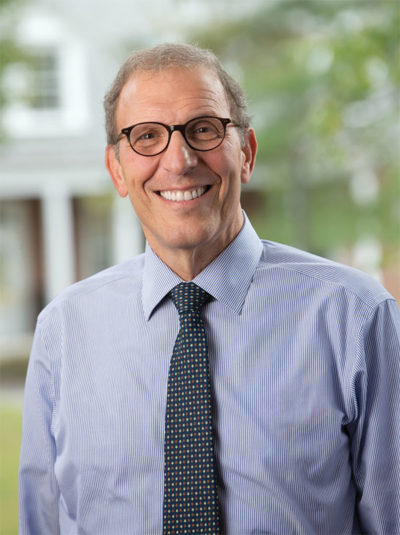
Babson President Leonard A. Schlesinger
When I became Babson’s 12th president on July 1, 2008, I knew I was taking the helm of an extraordinary school. I consistently referred to it as a gem among institutions of higher education, and was enormously excited to lead a college that had so much going for it.
Whether presiding over a large institution or launching a new business, entrepreneurial leaders start with the means, or assets, at hand. When I arrived on campus, it was clear that Babson had incredible assets that we would be able to build on and realign during the coming years to differentiate ourselves meaningfully in the marketplace. Working together we developed an intentional strategic agenda with a clear mission and goals—and then we delivered on it. We now can take great pride in our uniqueness and celebrate our status as the only school of its kind.
• No other school has made the world understand that the mindset and tools of entrepreneurial leadership, embodied in Entrepreneurial Thought and Action, are core to creating economic and social value in organizations of all kinds.
• No other school has such extraordinary talent and dedicated faculty, staff, students, governance, and alumni—all committed to Babson’s unique living/learning environment, which empowers our students to take action in and out of the classroom.
• No other school has the potential to continue to transform higher education and make an impact on the world in new and pioneering ways that we cannot even imagine today.
While strengthening our unique experiential model, we have extended our reach to campuses in Boston and San Francisco. At the same time, we have implanted our DNA in educational institutions around the world, and they draw on the intellectual and practical capital generated by their partnership with Babson.
I appreciate the many ways the Babson community has worked closely with me to develop and carry out a strategy that has moved the College forward on all fronts. Leading you on this journey has been one of the most rewarding experiences of my life. Of course, great schools never stand still. This spring we named a new president, Kerry Healey, to lead Babson into its centennial in 2019. Under her leadership, the College will advance and build upon our Centennial Commitments, which provide a blueprint for Babson and future graduates to accomplish more than anyone ever dreamed possible at a small college in Wellesley.

Leonard A. Schlesinger
]]>
Signed American College & University Presidents’ Climate Commitment. Introduced new strategic direction combining Entrepreneurial Thought and Action, social responsibility, and the creation of a global entrepreneurial education network. Established the Babson-Olin-Wellesley Three-College Collaboration. Launched San Francisco Fast Track. Joined 10,000 Women and 10,000 Small Businesses. Founded Babson Global and the Global Consortium for Entrepreneurship Education. Closed Babson Rising campaign $16+ million over goal three months early. Opened the Babson-Rwanda Entrepreneurship Center. Created sustainable financial model. Introduced curriculum reform. Joined Lemonade Day, helping 4,000+ Boston-area children learn about entrepreneurship. Met with hundreds of faculty and staff to hear concerns and answer questions. Extended venture accelerators and business competitions to accommodate more entrepreneurs. Brought Babson to Boston’s Innovation District. Committed to the Principles for Responsible Management Education. Announced record high 6,000+ undergraduate applications for class of 2017. Became charter participant in the Sustainability Tracking, Assessment & Rating System. Celebrated Babson MBA program’s No. 1 ranking in entrepreneurship for 20th consecutive year by U.S. News & World Report. Led the passage of the Centennial Commitments to ensure Babson’s continued excellence in the years to come.
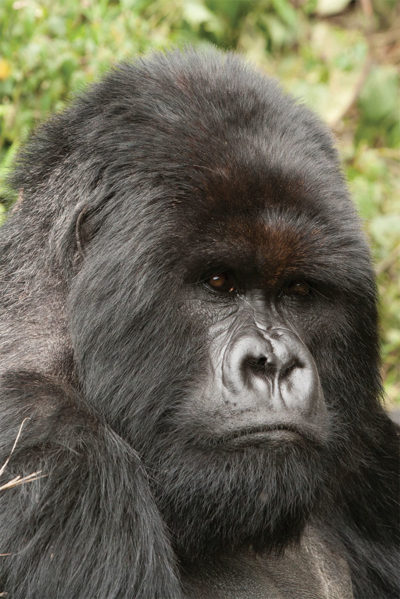
Photo: ©Meadeaglephotos
When Sally Eagle, MBA’78, and her husband, Dan Mead, backpacked around the world as amateur photographers in 1980, they had to carry their film, which forced them to consider each shot carefully. There wasn’t a focus other than personal enjoyment for their photography until 2009, when Eagle and Mead held their first photography show at a school where he once had worked. Eagle says, “We quickly realized that photography could be an effective adjunct to a curriculum.” So began their professional educational work, mostly with small private schools throughout New England, to produce shows that help teachers augment lesson plans.
Eagle says, “Our shows create dialogue and encourage students to come up with their own thoughts. Challenging kids about the long-range implications of vanishing cultures or melting ice caps is important.”
According to Eagle, her photography is photojournalism “of a sort,” but not of street or urban settings. Her focus is three-part: wildlife, landscape, and culture. “Sustainability is a recurring and evolving theme,” she says. “I have witnessed the encroachment of humans in animal habitats, and I have seen remote cultures that are threatened and changing.”
Choosing favorite subjects is difficult for Eagle. “The Himalayas are very special, as is the Buddhist culture. So perhaps, in my heart of hearts, Bhutan is my favorite place.” Eagle’s passion for nature and wildlife also is apparent in her photos. “Being in Africa in an open vehicle with a lion two feet away from the wheels is an amazing sensation—it gets the adrenaline going. And being 10 feet away from a mountain gorilla is magical.”
]]>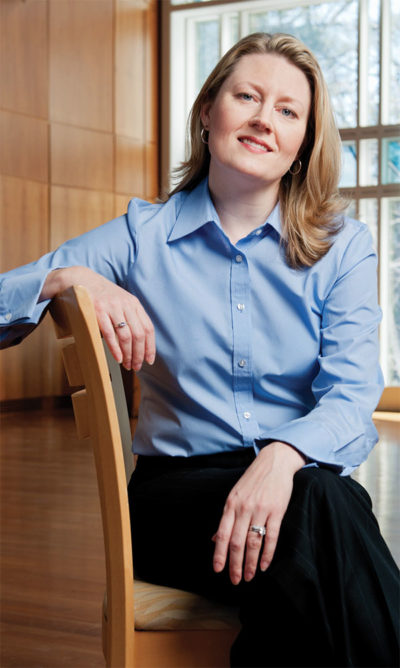
Photo: Webb Chappell
Babson Assistant Professor of Management, Wendy Murphy
Students should do internships, believes Wendy Murphy, assistant professor of management. “They need to try things on,” she says. Networking, mentoring, self-awareness. All these skills and experiences, she says, are critical to succeeding in today’s changing workplace. Murphy knows. She has been there.
As a senior majoring in studio art and psychology with plans for graduate school, she worked for a firm that provided support to girls who weren’t faring well in high school. Over time, Murphy developed a client base of girls she regularly helped—child care for their babies, help with homework, jobs in the summer. But the work, although rewarding, turned out to be too emotionally draining. “I would work Mondays for 10 hours, and it would be Thursday before I felt emotionally whole again,” she says. “I became really attached to people. Grad school would give you a lot of training and skills around that, but I just felt like it would be too much as a career.”
Finding a job related to her second major of studio art seemed out of the question. As the oldest of four and on full financial aid, she didn’t think she could make enough money to pay for loans and the bills. Fortunately, Murphy graduated in a boom economy and was able to switch gears. She took a job in former department store Filene’s executive training program and became a buyer. “Retail had this combination of business and creativity that felt like a nice fit for me,” she says.
She loved it and stayed for five years. But thoughts of the future again turned Murphy in a new direction. “I got to know one of my bosses really well, and she was exactly 10 years older than me,” says Murphy. “I’m grateful to her to this day, because as much as I loved her, I looked at her and said, ‘I don’t want to be her when I’m 35.’” The frequent travel, relentless long hours, and a changing industry (stores such as Kohl’s and Gap were taking business from traditional department stores, says Murphy) prompted her to go back to school.
With plans to earn an MBA, she took a course from The Princeton Review to prepare for the GMAT. Unexpectedly, the company called Murphy and asked if she’d be interested in teaching Saturday classes (her high scores had piqued their interest). She decided to try it and found teaching suited her well. Still looking to apply to MBA programs, Murphy then visited a former psychology professor to ask for a recommendation. They talked for two and a half hours about career options. By the time she left the office, Murphy decided to apply for PhD programs and become a professor of organi-zational behavior (OB).
Talent
I love oil painting. When I draw, I get so detailed that it gets to be almost painful and less creative, whereas when I paint, the brush is bigger, and that’s more freeing. My compositions become a lot more interesting.
Favorite Sport
Skiing, but I haven’t been able to go for a while, with 5-year-old twins and a 2-year-old. When my youngest turns three, we’ll be able to ski again.
Favorite Vacation
We love the water. Swimming is really important to us— my husband is a former lifeguard, and I took lessons at a beach growing up. We spend whatever time we can at a pool or on a beach in the summertime with the kids.
“It’s easy to see how the pieces fit together now,” she says. All her interests—psychology, business, teaching—could be wrapped into the one profession of teaching OB. But had she not connected with her former professor, who knew about Murphy’s past ambitions and took the time to ask questions and provide guidance, Murphy might have gone in a different direction.
Perhaps kismet played a part in Murphy’s future, but she now uses her knowledge of mentoring, self-awareness, and networking to help Babson students consciously shape theirs. For the MBA program, she teaches the “Managing Talent” signature learning experience, a weeklong intensive that prompts students to think about how they’re managing their careers, their talent, and other people’s talent. “There are these great moments in the class when students can increase their self-awareness and think about diversity in the classroom, not only in the traditional sense, but also in terms of behavioral styles and people’s preferences and perceptions at work,” says Murphy. “The class also gives students a chance to pause and think about their careers more holistically. At the end of the week, they come away with a career development plan.”
At the undergraduate level, Murphy sees her experiences and research, which focuses on developmental networks and mentoring, enhancing what she teaches in OB. Most students will hold three to five jobs by the age of 30, she says, which makes developing the skills needed to manage their careers that much more critical. “You need to have people helping you think about your career from both inside and outside of the organization,” she says, “and they should be at multiple levels. You should have someone higher up than you, peers, and someone from a different industry altogether who can give you perspective. So you’re thinking through, ‘What does an appropriate developmental network look like for me?’ And students should start this process in college.”
In addition to her classes, Murphy works with the Center for Women’s Entrepreneurial Leadership as the coordinator of its mentoring program. Having developed a successful program while teaching at Northern Illinois University, Murphy knew that being exposed to mentors early on increases students’ abilities to develop beneficial professional connections, even outside of their formal mentoring relationships. “Those students are more willing to approach people, to ask questions, and to get feedback on career opportunities,” she says. She’s helping to make CWEL’s program easier to manage and more robust while extending it to more students.
On campus for almost two years now, Murphy feels she made the right move coming to Babson. “The students are just so interesting and engaged, smart and thoughtful,” she says. “And the student body is so diverse. When we’re talking about international culture in class, I have students who can share their experiences firsthand and challenge others’ perspectives in a way that you can’t simulate.”
She finds her peers equally diverse and enriching. “It’s hard to even explain to people until they get here and see what’s going on,” says Murphy. “I love Babson. I’m so lucky to be here.”
]]>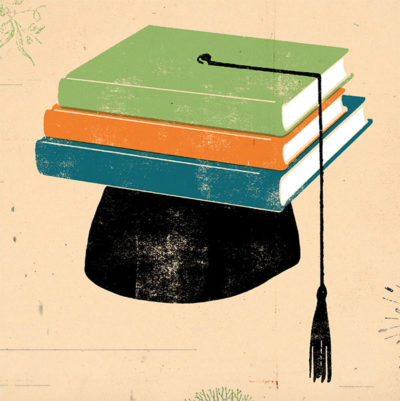
Illustration: Richard Mia Collection/theispot.com
Cap and gown season is upon us. At the May 18 Commencement exercises, graduating students will close out their Babson careers. They’ll hear Patrick Awuah, founder and president of Ghana’s Ashesi University College, speak at the morning’s undergraduate ceremony, and Kip Tindell, co-founder, chairman, and CEO of The Container Store, speak at the afternoon’s graduate ceremony. Awuah, Tindell, and Saras Sarasvathy, professor and entrepreneurship scholar at the University of Vir-ginia’s Darden School of Business, will receive honorary degrees. In the weeks leading up to Commencement, graduates recalled the professors and classes that inspired them.
CHET CLEM, MBA’13: Professor Heidi Neck’s introductory entrepreneurship course always reminded me of the Elvis lyric, “A little less conversation, a little more action please.” She pushed us to stop theorizing and just experiment. She preached about the importance of failure in the creative process, and then facilitated an environment in which it was safe to fall flat on your face. Plenty of students can tell you about a professor who helped them succeed, but it’s rare to speak so highly of a professor who helped you fail.
CHRISTINA CONSIGLI ’13: Kerry Rourke proved to be a nurturing professor in her “Practicum in Peer Consulting and Writing” class. She encouraged me to be confident in my writing skills and to challenge myself with different communication techniques. She was also an amazing adviser. She helped me grow into a strong, open-minded woman by encouraging me to invest in my interests. She was always there when I needed advice, someone to talk to, or just a good book to read.
STACEY MUKASA ’13: During my Babson career, I experienced many classes that changed my understanding of the world around me. One such class was “Culture, Society, and Entrepreneurship in Developing Economies,” which gave me the amazing opportunity to travel to Ghana to teach entrepreneurship at high schools throughout the country. Having the ability to take the skills and knowledge that I acquired at Babson and share them with individuals who are yearning to learn was the most fulfilling part of my Babson experience.
BARB SPANGLER, MBA’13: Professor Allan Cohen introduced the concept of negotiation as a lifetime constant, and helped us understand what motivates ourselves and others. He also introduced the idea of a personal bottom line and the importance of understanding our sense of commitment to whatever we try to accomplish. I took his leadership course while in the middle of a sensitive project negotiation. I asked him for guidance, and we had many conversations. He doesn’t tell you what to do; he shows you a landscape and lets you walk the path of your choice.
KEVIN WEBB ’13: The professor who influenced me the most was Laurie Krigman, who teaches finance, which is my concentration. She strengthened my understanding of how a business functions financially by making a difficult topic understandable. Laurie (she wants us to call her by her first name and won’t respond if you don’t) goes the extra mile to help students interested in finance, even creating a finance alumni network that matches students with alumni who work in the field that they’re interested in.—John Crawford
]]>